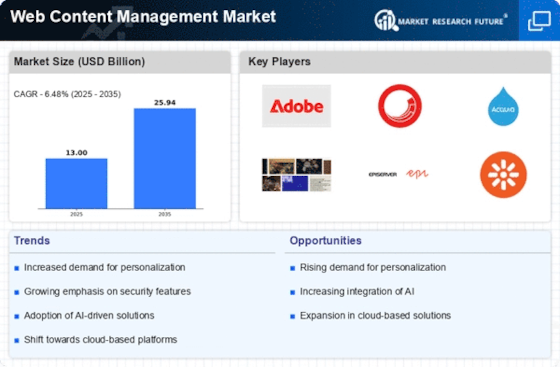Top Industry Leaders in the Web Content Management Market

Competitive Landscape of the Web Content Management Market
The web content management (WCM) market is a dynamic and rapidly evolving space, characterized by intense competition among established players and the emergence of new and disruptive technologies. This report delves into the competitive landscape of the WCM market, analyzing key players, their strategies, and factors influencing market share distribution.
Key Players:
- Adobe (U.S.)
- EpiServer (Sweden)
- Opentext Corporation (Canada)
- Sitecore (U.S.)
- Hyland Software Inc. (U.S.)
- E-Spirit AG (Germany)
- Microsoft Corporation (U.S.)
- Progress Software Corporation (U.S.)
- Crownpeak Technology Inc. (U.S.)
- IBM Corporation (U.S.)
- Oracle Corporation (U.S.)
Strategies Adopted by Key Players:
The key players in the WCM market have adopted various strategies to compete effectively, including:
- Product Development: Continuous development of new features and functionalities to cater to evolving market demands.
- Cloud-Based Solutions: Increasing focus on cloud-based WCM solutions for scalability, flexibility, and ease of use.
- Strategic Acquisitions: Acquiring smaller companies with niche expertise to strengthen their offerings and expand their market reach.
- Partnerships: Collaborating with technology partners and marketing agencies to offer comprehensive solutions and reach a wider customer base.
- Open Source Technologies: Leveraging open-source platforms like Drupal to offer customizable and cost-effective solutions.
Factors for Market Share Analysis:
- Product Offering: Functionality, features, scalability, and integration capabilities.
- Target Market: Focus on specific industry segments or business sizes.
- Pricing Strategy: Subscription models, licensing fees, and additional service costs.
- Brand Reputation: Established brand presence and customer satisfaction.
- Technology Innovation: Ability to adopt and integrate new technologies like AI and machine learning.
- Channel Partnerships: Strength of partnerships with technology companies and system integrators.
New and Emerging Companies:
Several new and emerging companies are entering the WCM market, offering innovative solutions and challenging the established players. These companies include:
- Contentstack: A cloud-based headless CMS platform with a focus on API-driven content delivery and integration with other applications.
- Storyblok: Another headless CMS platform offering a simplified user interface and a focus on content creation and collaboration.
- Prismic: A cloud-based WCM platform with a focus on agile content management and easy integration with third-party tools.
- Agility CMS: An open-source CMS platform known for its flexibility and cost-effectiveness for smaller businesses.
- Kentico Kontent: A cloud-based CMS platform offering a headless architecture and strong omnichannel content delivery capabilities.
Current Company Investment Trends:
- Cloud-Based Solutions: Continuous investment in cloud-based WCM offerings to cater to the rising demand for scalability and flexibility.
- AI and Machine Learning: Integration of AI and machine learning technologies for automated content creation, personalized experiences, and content analytics.
- Headless Architecture: Growing adoption of headless CMS platforms for greater flexibility and integration with front-end development tools.
- Security and Compliance: Increased focus on security features and compliance with data privacy regulations.
Latest Company Updates:
The open-source content management system TerminusCMS, which interfaces with its graph database, was introduced in 2023 by TerminusDB, a graph database startup. With the new approach, content creators may manage and distribute their work using a graph database, which offers benefits including increased flexibility, deeper linkages, and more efficient content reuse.
The Answers Company, Yext, Inc., announced today that Content Generation has been added to its Knowledge Graph offering for 2023. According to Yext, the Knowledge Graph is the only content management system available that creates material on its own, both proactively and automatically. The business has been testing Content Generation for a year with a number of clients, and in March it will formally launch in conjunction with Yext's Spring 2023 release.










